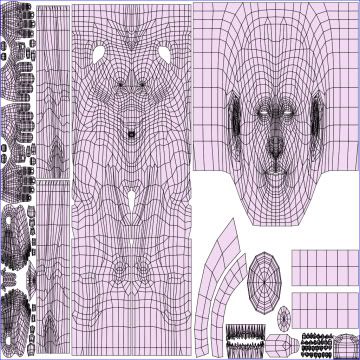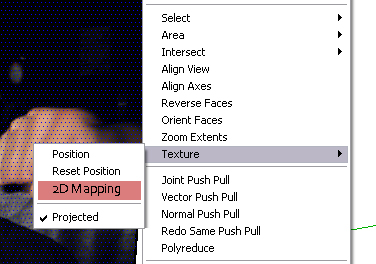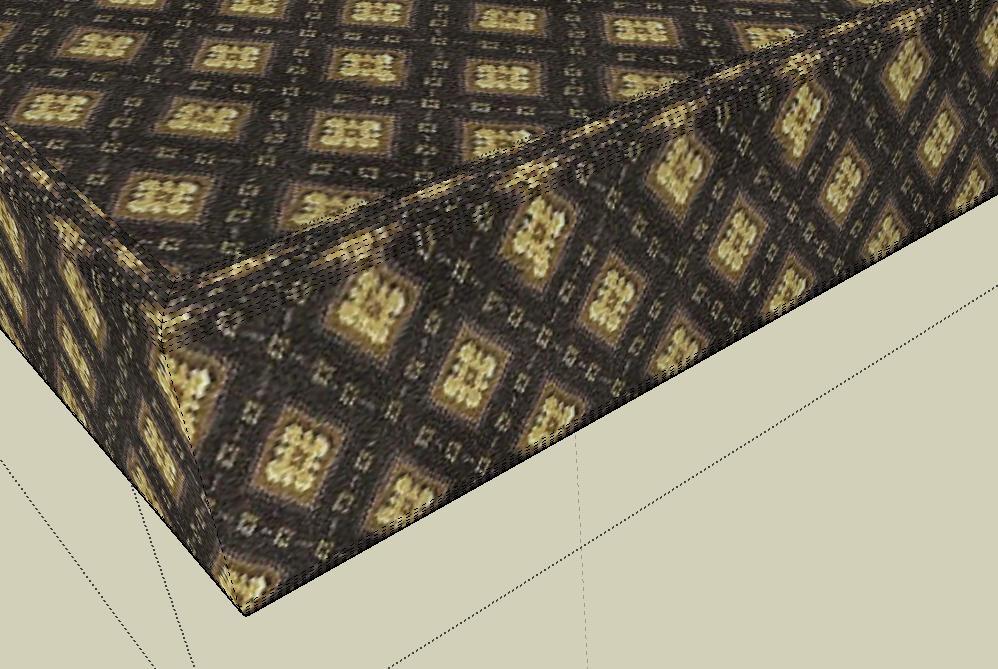Unfold.rb script: useful for UV-mapping?
-
I have been following, but I don't know the first thing about UV mapping.
@unknownuser said:

I'm not sure I understand how this image was created. I don't think it is a simple unfolding. Has there been some deformation of faces in order to close gaps?
-
That image derives from (soft) selecting parts of a 3D human body model.
The different selected groups (hands, head, etc...) are unfolded on their own so for each item a different texture can be made/edited in Photoshop. So the splitting up thing is user based. The smallest parts you see are finger joints, as they need refined Pshop maps applied etc...This example off course is the most complex one, where different parts of the model get unfolded seperately.
Solos sphere demonstration (see his images)or Howardshongs apple are somewhat closer to daily use in SU I guess, but the principle remains the same.The '3D Pin method' earlier described would even make it much more WYSIWYG, as you can directly see the effect of moving a pin on the 3D surface.
Stuff to think about
 ....
.... -
I think the two mapping techniques being discussed here are different or should be! the rewrapping versus pinned deformation!
This function of wrapping and rewrapping is quite common to other modelling and texturing apps. Maybe someone with one of these could show example!
-
I think the multi-pin-method should be used throughout the whole texturin process (so that you can apply complicated distortions even to a simple rectangle shape).
I like the idea to select the "2D Mapping" tool from the standart context menu for manipulating textures.

if you simply select the 2D Mapping option and an unfolded copy of the object is shown, on which you can position your texture - when you are done, press enter and the only thing that remains is the perfectly textured 3D model (no manually unfolding and refolding geometry - very fast and easy workflow!)
-
Because I just recently became interested in this subject, I found this on a search and I'm resurrecting.
Further to the above speculations, I was thinking it would be great to be able to substitute a whole group of textures that are mapped to the subcomponents of a model,such as a person or a car for instance. That way, instead of providing the person or car in various colour verisons as an skp, all you need to do is substitute a material library on an existing model. If one must create a new skp for the same model, in a different colour, or maybe with some different detailing, when you create the variations you would have to go through mapping all the compoenets one by one again on the same model. Having a swap feature for the material "set" would be great.
-
okay, I found a ruby script on Didier's site: Global material changer.
It is almost doing exactly what I want. It replaces any one or "ALL" of a the materials on an model/component. But your choices for replacing are only with a single default material or something from the existing list. So how difficult to modify this so that you can replace with a material set that has some built in- one to one relationship to the existing materials? Maybe same name with a numeric modifier? -
@sorgesu said:
Because I just recently became interested in this subject, I found this on a search and I'm resurrecting.
Further to the above speculations, I was thinking it would be great to be able to substitute a whole group of textures that are mapped to the subcomponents of a model,such as a person or a car for instance. That way, instead of providing the person or car in various colour verisons as an skp, all you need to do is substitute a material library on an existing model. If one must create a new skp for the same model, in a different colour, or maybe with some different detailing, when you create the variations you would have to go through mapping all the compoenets one by one again on the same model. Having a swap feature for the material "set" would be great.
Swapping is already possible, even with uv-sets in place (as long as the new bitmap has the same image size as the old one.)
Write down the dimensions of the existing texture (the dimensions specified in the material editor).
Then do the substitution from within the 'Entity layer' (NOT from material editor).
Next thing to do is going to the material editor and change the dimensions to the ones you wrote down.
It's tedious but it works. -
NO swapping is not currently passible for ane entire "group" of materials all at once, which is what I was requsting.
Say I have a car component and it has 17 materials assigned to different portions of the car. I want those 17 materials defined as a "set" and I want another set containing a different 17 to be swapped in in one go.
-
Indeed: No for groups of materials, Yes for ungrouped meshes containing 1 material.
-
Susan,
I'm working on it.

-
OMG that's amazing. Thanl's a heap!!!
-
Rick can you get your 4 month old to help out with ruby coding and expedite the process..
-
@unknownuser said:
Rick can you get your 4 month old to help out with ruby coding and expedite the process..
Now now Phil, all good things come to those who wait.
-
Very interesting thread!!! I have some physical models I need to build for an exhibition, so this would be very useful but I can't get the unfold script to work on Vista, any ideas?
@unknownuser said:
Blender has the capability you are requesting, KB. Neatest part is where you can actually use painting tools on the unfolded map and then see them applied in the rendered viewport.
I haven't used it in a while, but now that I've been given a little project with a certain degree carte blanche I was planning on testing all kinds of integrations with SU, Blender, and more obscure programs.
Lewis,
Please could you let us know how this goes, I have generally found Blender to work very well with SU imports/exports.
-
@unknownuser said:
Very interesting thread!!! I have some physical models I need to build for an exhibition, so this would be very useful but I can't get the unfold script to work on Vista, any ideas?
mate youi could do a search on the net for paper arch models. I know once there was a thread on the PPB about these and there was a link to an application that could output a flat plan unfold to produce a paper model from digital models....
-
@richard said:
@unknownuser said:
Very interesting thread!!! I have some physical models I need to build for an exhibition, so this would be very useful but I can't get the unfold script to work on Vista, any ideas?
mate youi could do a search on the net for paper arch models. I know once there was a thread on the PPB about these and there was a link to an application that could output a flat plan unfold to produce a paper model from digital models....
that would be Pepakura i suppose???
http://www.tamasoft.co.jp/pepakura-en/ -
Thats the one mate!!!!
-
Yes I have the free version of Pepakura and it's not bad, I made a fairly good Gherkin model with it("gherkin" is the nickname of a building in London called St Mary's Axe). But on more complicated geometry it doesn't do as well.
-
@solo said:
Make a cone shape and then project the texture attached below to the cone from above view, notice it will map the shape of the cone perfectly without distortion.
How did you do this trick, with PS think but how did came up with the idea.
Ive got this mapping problem with this mesh. also trying to learn blender right know so i can use the UVmapping abbility

-
Hi Rombout,
See this post in the other topic you posted the same problem.
Advertisement







